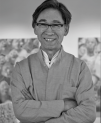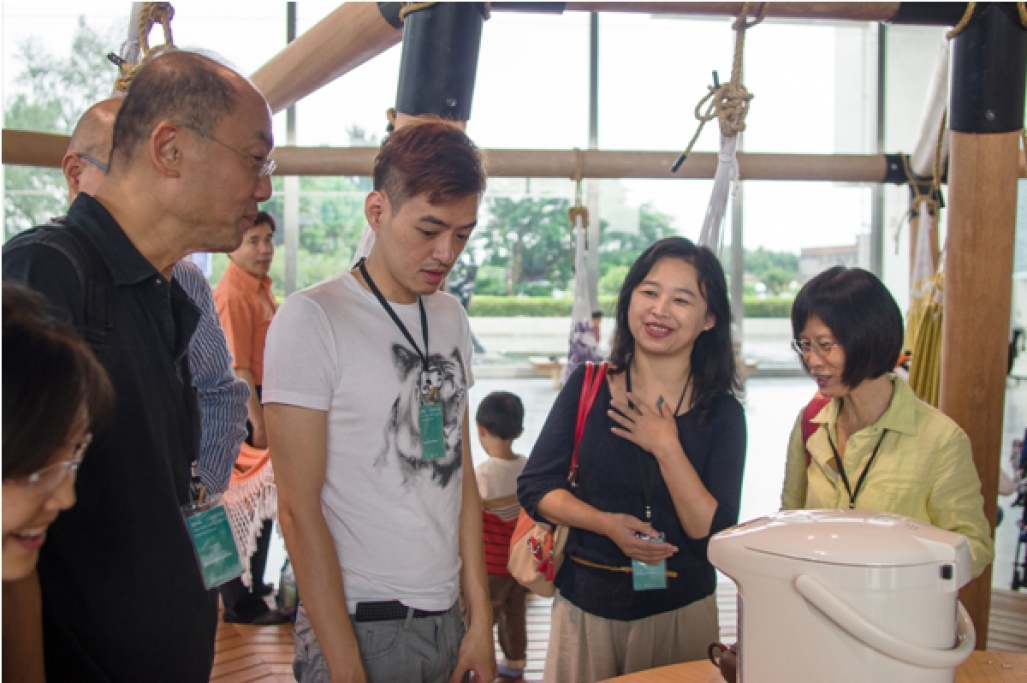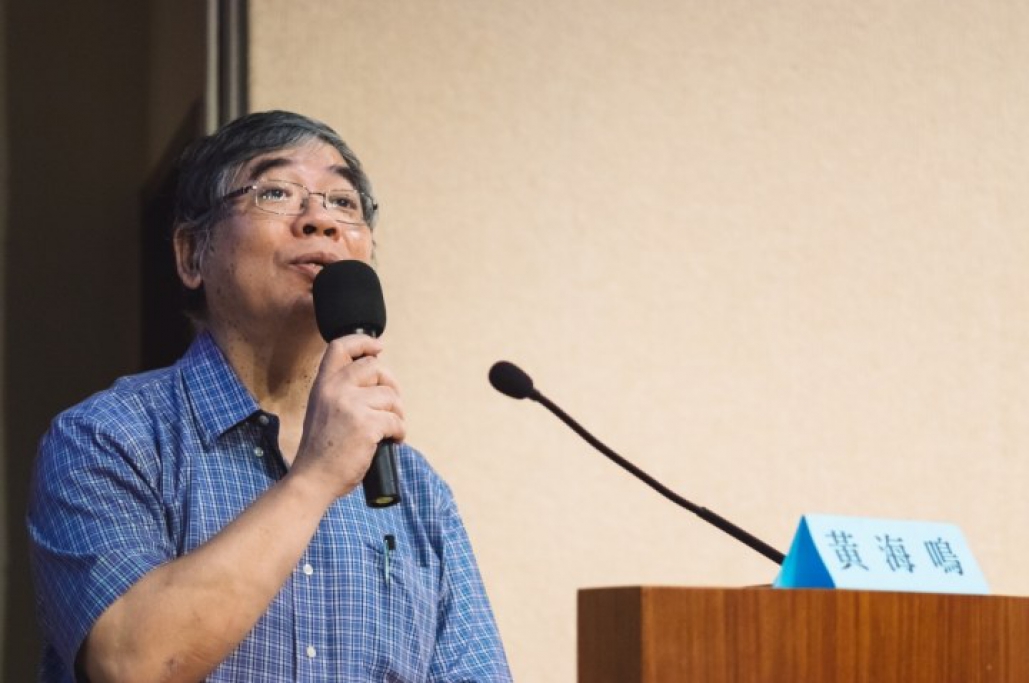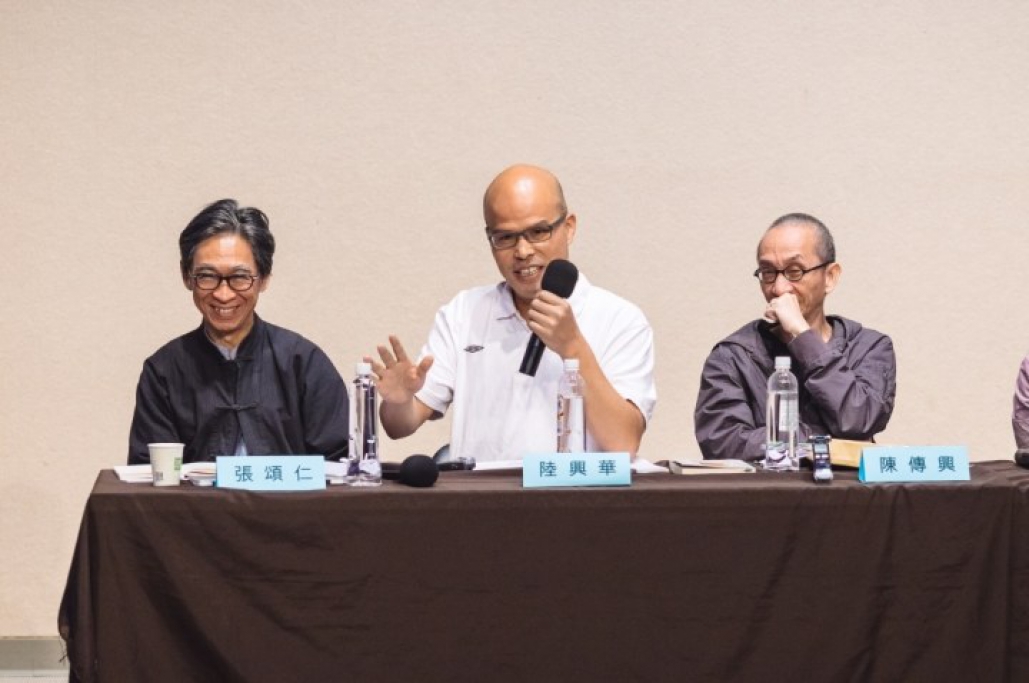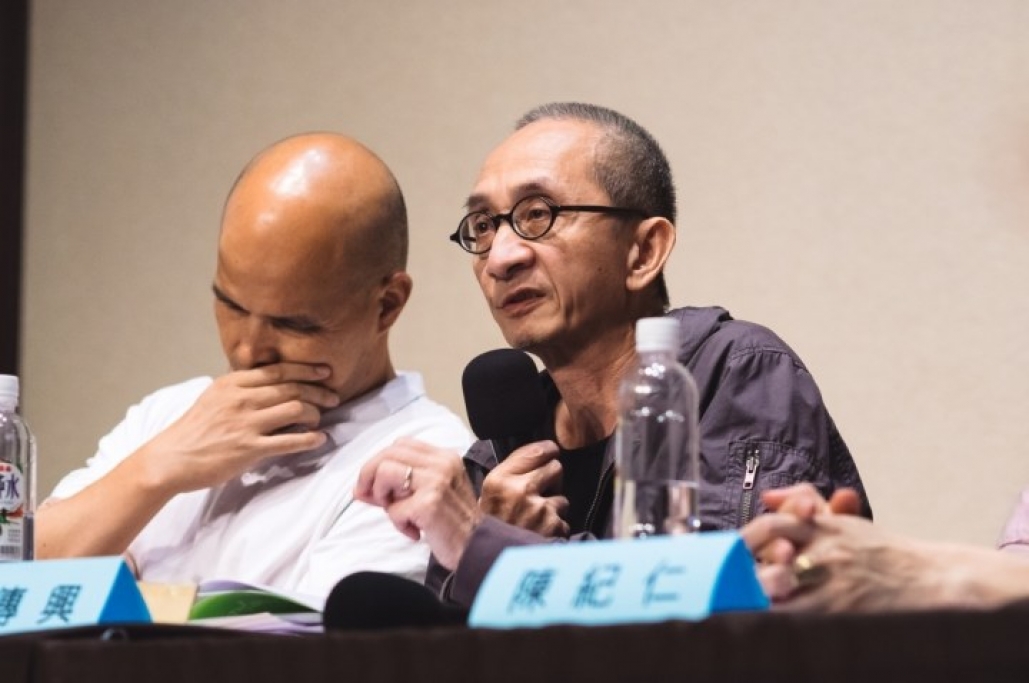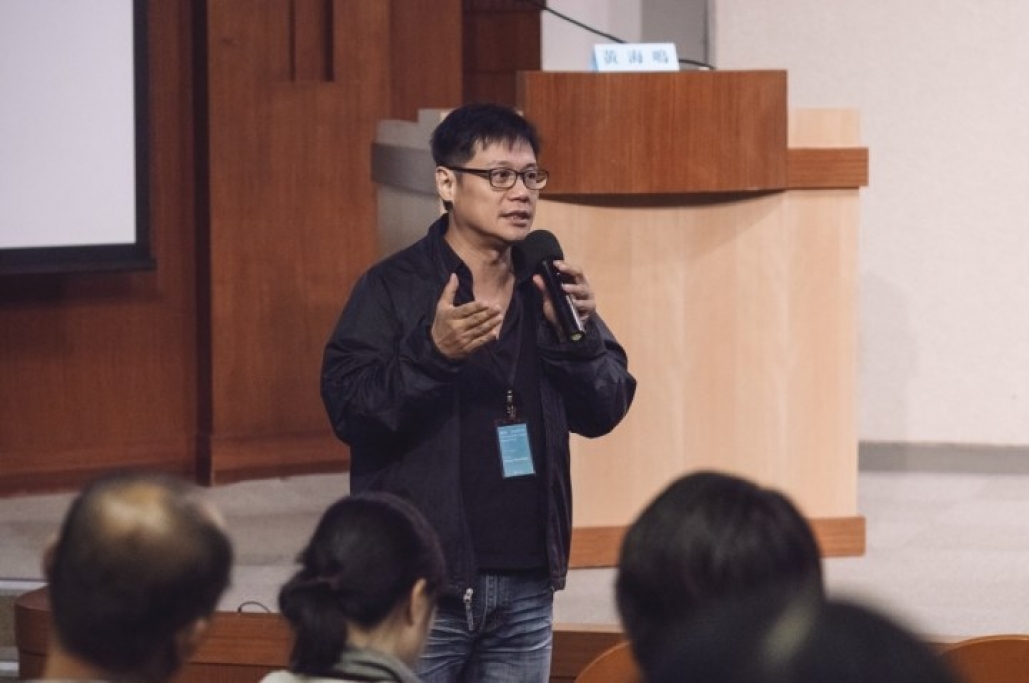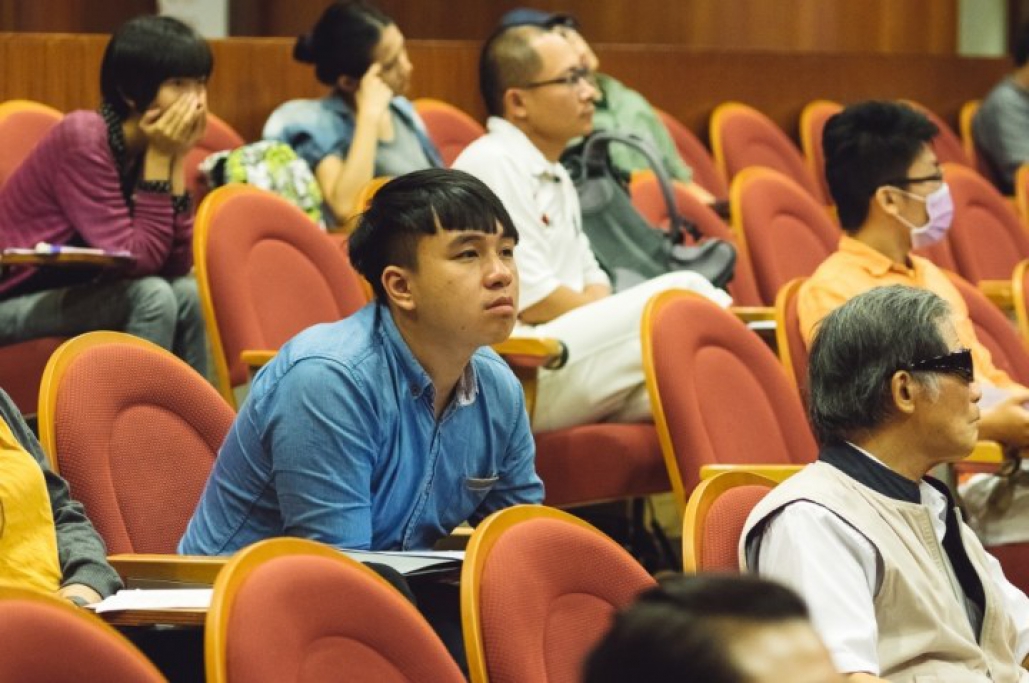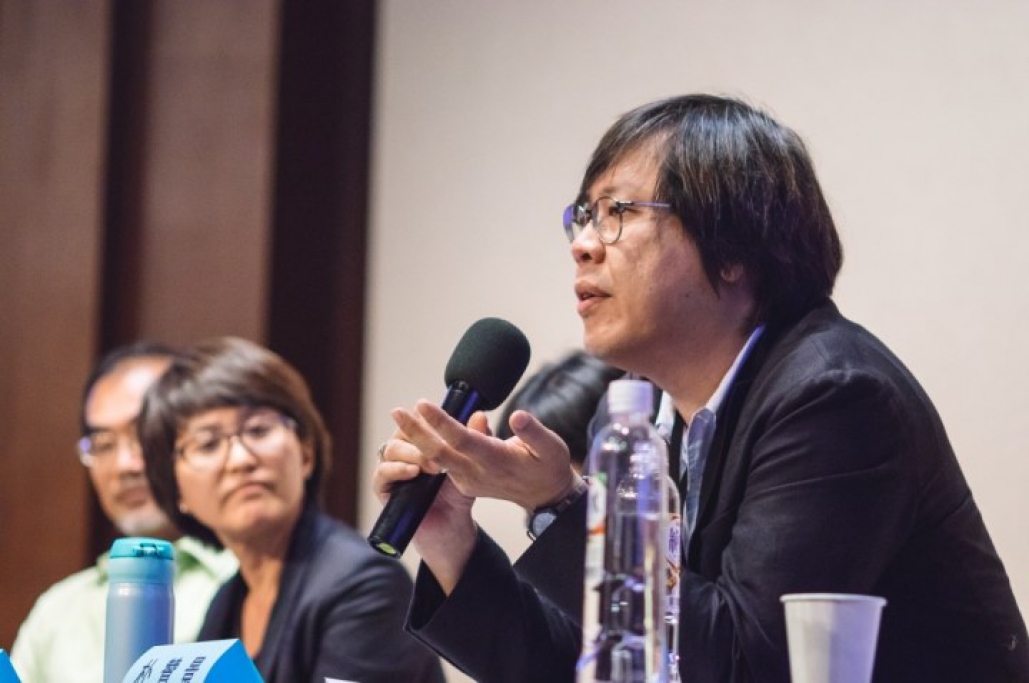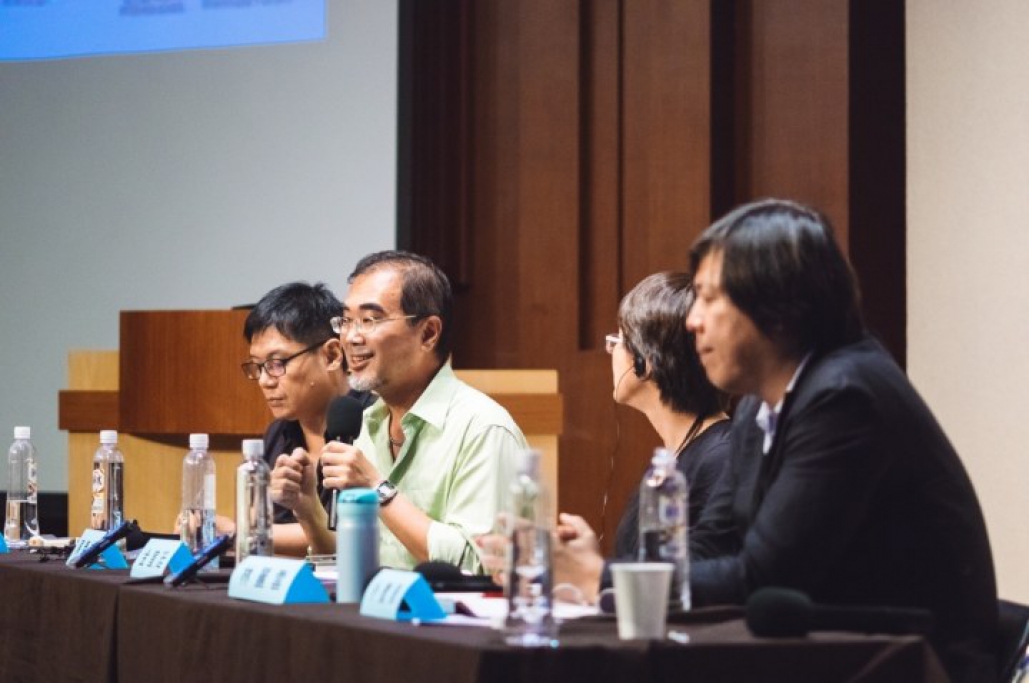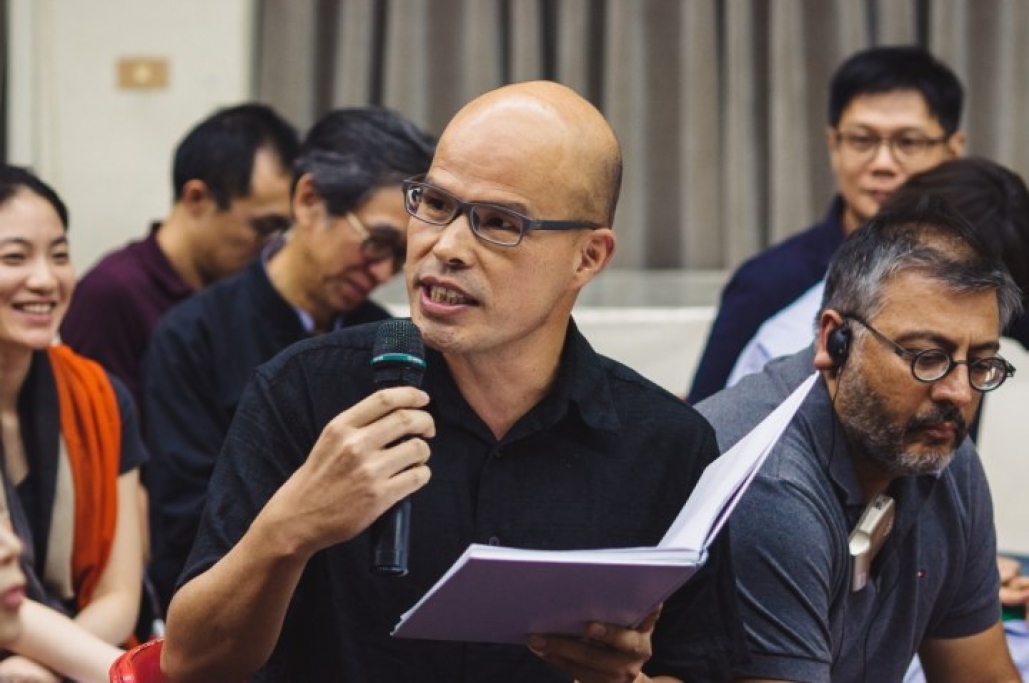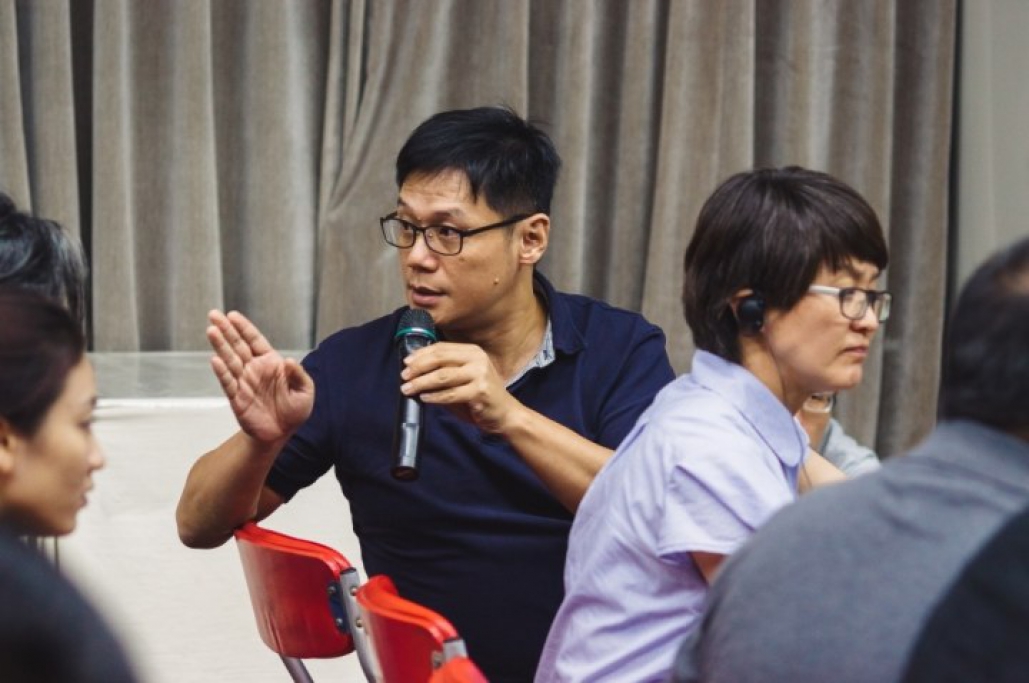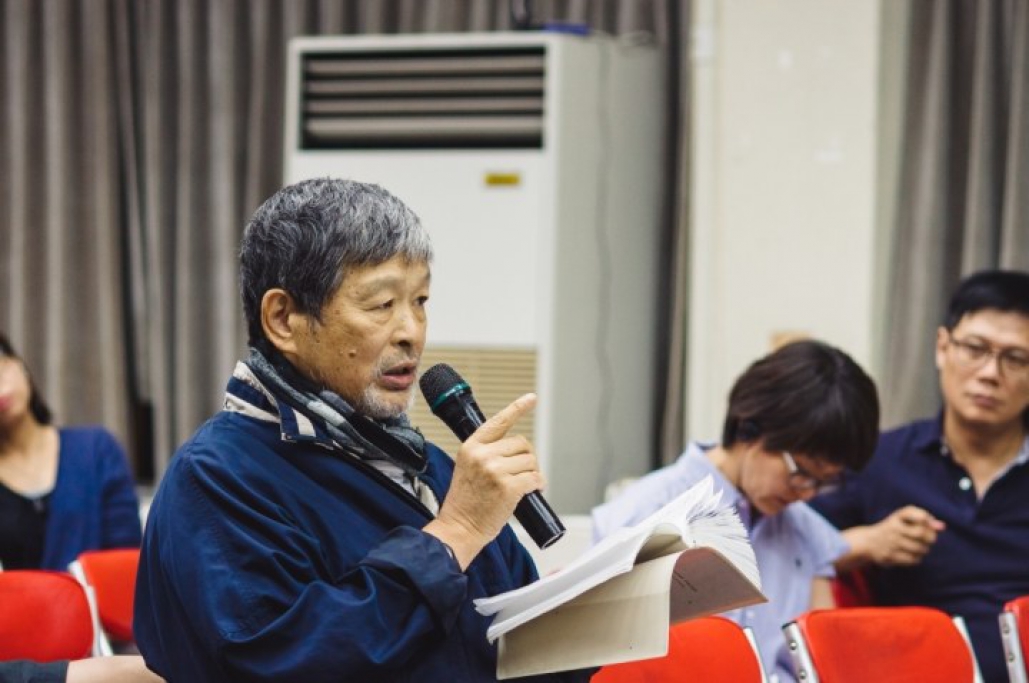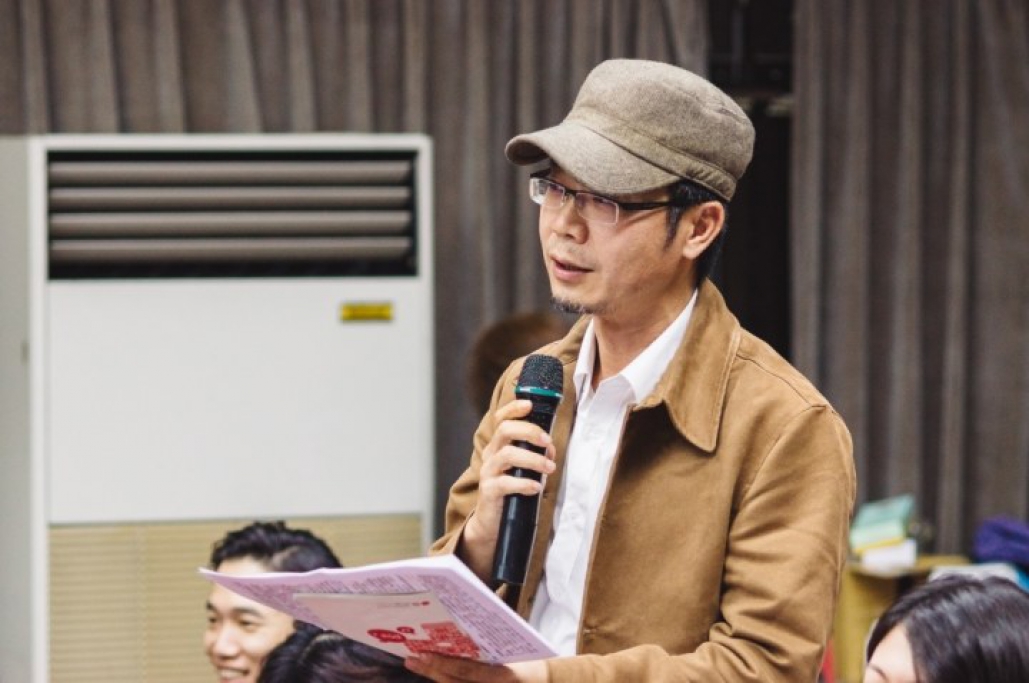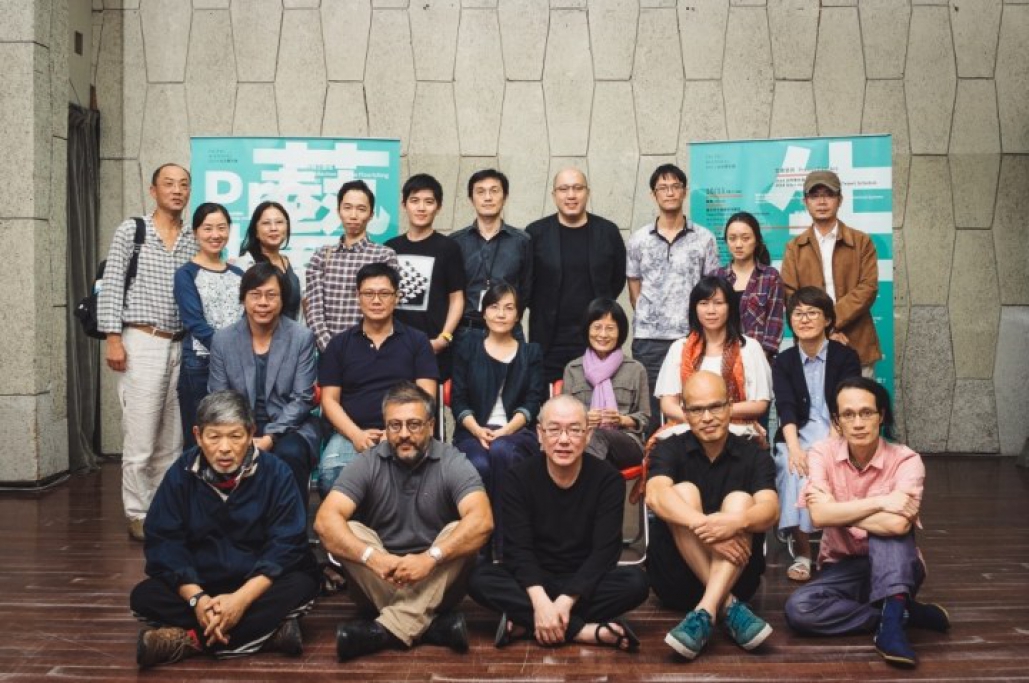
生產藝術 Production Art
主辦:亞際書院
協辦:臺北市立美術館 交通大學亞太/文化研究室
贊助:夢周文教基金會
地點:臺北市立美術館視聽室(台北市中山北路三段181號) 清華大學月涵堂(台北市金華街110號)
Organized by Inter-Asia School
Co-organized by Taipei Fine Arts Museum, Center for Asia-Pacific/Cultural Studies, NCTU (APCS-NCTU)
Sponsored by Moonchu Foundation
Venues: Taipei Fine Arts Museum Auditorium (B2, 181 Zhongshan North Road Section 3),
Yue-han Hall (110 Jin Hua Street Taipei)
2014台北雙年展論壇召集人:黃建宏
Huang Chien-Hung, Taipei Biennial Forum Convener
「亞際雙年展論壇」發起人:張頌仁、高士明、陳光興
Inter-Asia Biennale Forum Initiators: Chang Tsong-Zung, Gao Shiming, Chen Kuan-Hsing
亞際雙年展論壇在台北論壇,以「生產藝術」作爲切入點,一方面以東亞的藝術創作面貌積極回應策展人Bourriaud在此次雙年展中提陳的「共活性」與「共相關性」,另一方面企圖從生産藝術的思考面向上,將人、物及非人之間的支配關係與創造方法,開展為一種亞洲的思想場域。
The Taipei Forum of the Inter-Asia Forum will take the concept of “Production Art” as its starting point. On the one hand, this is a response to curator Nicolas Bourriaud’s (the founder of Relational Aesthetics) concepts of “co-activity” and “co-relational”. On the other hand, the Forum will seek to open up a platform for Asian thought, beginning with reflections on production art, and on the relationships of dominance among the human world, the non-human world, and the world of the things, as well as methods of creation.
生產(生產力與生產關係)與當代的生命政治息息相關。每個勞動個人或每項勞動力都蘊含著某種體制的運作,然而,這種個人與體制之間在生産關係上的依存症,使得生産變成難以言說的失憶與歷史匱缺的區塊。勞動身分與契約身分因為同社會價值或職場權力的階序制密切關聯,而無法進行言說;反過來看,文化支配中不均衡的生產力與不平等的生產關係,也使得老套的殖民模式始終難以在今天的民主社會中消弭。事實上,自二戰開始論及總體戰爭時,其底蘊就是一種生產的戰爭(生產工具的爭奪、生產力的維續、生產關係與政治結盟的同一化……),同樣,在藝術與思想的實踐領域中,「我們如何面對生産?」已經成為面對歷史與權力最為激進的問題。而物與技術,以及作爲參與生産運作的勞動者(生産者、工作者、藝術家……)就成爲這無法面對的權力支配關係及歷史書寫的「靜默」或「空白」的可能載體。因此,我們嘗試在臺北論壇中建立起一個思想的界面,連結起歷史生成、個人記憶、生命政治、物的生產、生產關係等等,來面對今天最爲嚴苛的問題:如何面對生産?如何面對存在著支配關係的生産?如何面對生産對于權力與知識的支配?
Production (productive forces and production relations) is intimately related to contemporary biopolitics. Every labouring individual or act of labour contains the operations of a particular system of organisation. The syndrome of dependency that exists in the production relations between the individual and the system turns production into sites of ineffable amnesia and historical absence. Because of the intimate interrelationships between social values and hierarchal power relations in the workplace, the status of labour and the status of contracts remain indisputable; conversely, inequitable productive forces that are the result of cultural dominance and unequal production relations, make it difficult for antiquated colonial structures to be eradicated completely from present-day democratic societies. In fact, since the beginning of World War II, discussions of “total war” have always taken the assumption that war was nothing more than the conflict over production (a struggle over the means of production, the uninterrupted maintenance of the productive forces, the collaboration between production relationships and political alliance, etc.). Similarly, in the realms of art and philosophical practice, the question, “How do we deal with production?” has become the most radical issue confronting history and power. At the same time, goods and technology, as well as the labourers involved in actual production (producers, workers, artists...), have become the potential vessels of the “silence” and “blank spaces” within historical writing, created by the implacable relations of power dominance. Thus, at the present Taipei Biennial Forum, we intend to create an interface between the generating of history, individual memoirs, biopolitics, production of things, and production relations, etc., as a way of dealing with today’s most pressing issue: How to deal with Production? How to deal with production in which relationships of dominance still exist? How to deal with production and its dominance of political power and knowledge?
如此,我們便需要面對在不同文化處境中,物與生産之間互爲决定的關係,以及這决定關係中所帶動的生産社群。然而,在劇烈加速度的人類世共業中,我們可以發現傳統意義上的生産社群在資本主義與全球化的作用下早已瓦解。因此,新的生產方式與交易方式也相形迫切,而生產方式與交易方式的創新必須根基於新的「社群」之生産。因此在人支配人以及人支配物之後,進而以被支配的物來支配人。資本主義的推波助瀾,以及冷戰時期的代工建置與意識形態建置,都一再地說明物與社群的緊密關連是我們必須正視的問題:生產關係決定著物性,以及從既有政治經濟關係中解放物性的可能。
For these reasons, we must examine the mutually determined relationships that exist between things and production within different cultural situations, and the productive communities that are driven by these determinative relationships. In the dramatically accelerating enterprise of humanity, we discover that the productive communities in the traditional sense of the term have long disintegrated as a function of capitalism and globalisation. Man having dominated man, and man having dominated things, we now have a situation in which things dominate man. For this reason, the creation of new forms of production and exchange has become increasingly urgent; and innovation in forms of production and exchange must be based on the production of new “communities.” Exacerbation of the situation by Capitalism, the systems of OEM (original equipment manufacturing) and ideology characteristic of the Cold War era all serve to reiterate the importance of investigating the problem of the close relationship between “things” and communities. The relations of production determine the nature of things, and make possible the liberation of the materiality from the existing political and economic relations.
物,不再是物件或無機物,而是個體或社群進行表達及擴展自身時,所賴以爲藉的「他者」。「萬物有靈」既不只是一種「賦靈」,也不會只是片面幷抽象詮釋下的「解構」理性與現代性的「域外工具」,更爲深刻的是人本來就倚賴幷布署著各種物才得以構成世界這一宰製性的球體:「殖控」意味的不正是化約各種物的意涵,並在人與物之間建立一種無法跨越的階級制,以完成一個以資本主義爲名的單義世界?但「物」在不同文化所分化出的差异性裏,就已經說明其多樣意義的狀態,或者說其動態意義必須在生態關係中被理解。在此面臨的問題是——是否存在跨越文化的發展?當物隨著殖民史全球遷徙時便帶動了「技術」或「技藝」的在地發展,而跨文化、跨區域的「技術」或「技藝」遷徙,會更爲直接地在個體與社群網絡中施展其文化之力,打開一種沉默的協商空間。從這裏出發,我們或許可以在物之權力、物之社群與物之協商三個面向的思考中,從對各類「支配」關係的批判或抵抗中,匯聚出一種生態式的、共活性的「生產」藝術與思考。
“Things” are no longer merely physical or inorganic objects. Rather, they are the “others” that individuals and communities use as a way of expressing or enlarging their identities. “Animism,” the notion that all things have a soul, is not just a kind of “spiritual endowment,” nor is it merely a “deconstructed” rationality that provides a partial and abstract interpretation and contemporary “external tool.” On a deeper level, people basically rely on and deploy a wide variety of things to enable them to construct the world, this globe of domination. Is not “Colonial domination” exactly that process of reduction of the significance of every kind of thing, and the establishment of an unsurpassable class system between people and things, as a way of creating a world of singular meaning in the name of capitalism?
But “things,” in the way they are differentiated in different cultures, already provide a situation for their having a diversity of meanings; in other words, their dynamic meaning must be understood in terms of their contextual “ecological” relationships. The question being raised here is: Is there a form of development that is able to transcend culture? As things follow in the footsteps of colonialist history, migrating to all corners of the earth, thus spurring the Glocalisation of “technology” or “skills,” intercultural and interregional migration even more directly demonstrates the cultural authority of things in the web of individuals and communities, and opens up silent spaces for negotiation. Starting from this point, perhaps we may begin to address the following three notions: “the power of things”, “the community of things”, and “the negotiation of things”. From a critique of, and resistance, to every kind of “dominance” relations, perhaps attempt to collectively produce an art and philosophy of “production” that is both ecological and interactive.
10月11日-12日,我們分別在臺北市立美術館視聽室和台北清華大學月涵堂舉辦的論壇和討論會。具體議題如下:
The Inter Asia Forum and conference will take place on October 11 in the Audio Visual Center of the Taipei Fine Arts Museum and on October 12 in the Yuehantang at National Tsing Hua University in Hsinchu, respectively. The specific topics for discussion are as follows:
1. 物與體制(召集人:張頌仁)
「物」既是被資本機制闓踰的資源,是等待被宰割的「他者」,也是通過生產制度左右著社會關係的樞紐。在生產關係裡的物,既有被約化為階級支配的載體,也有不能被這種關係完全涵蓋的「他者」特質和他力。例如,從生產過程中轉化過來的「物」,最後化身為污染和環保問題,正呈現了這種他力的發揮。物不能被徹底約化、抽象化,表示不同歷史文化的技藝對物的品性發揮了多種可能。无论在何种文化中,物從未脫離過人的支配,同時也成為人支配他人的重要媒介。在「现代」亚洲,物究竟被置放在什麼樣的体制框架中?人在不同權力體制中又如何支配物或为物所支配?如果「解放」依然是有效的歷史目標,那麼人的解放最終或许也有賴於物的解放。
Session 1: Things and Institutional Systems (Convener: Chang Tsong-Zung)
“Things” are resources that are constantly scrutinised as economic asset by capitalist mechanisms. They are the “Other” awaiting exploitation, as well as the fulcrum for the manipulation of social relations by means of the system of production. In the relations of production, things have been reduced to the status of the means for class domination; yet they also possess the special characteristics of “the Other” that cannot be encompassed simply by these relationships. For example, “things” transformed by the production process that subsequently take on new forms as pollutants or environmental damages, are a perfect example of this irreducible “Otherness” of “things”. The fact that Things cannot be simply reduced to nothing or be totally abstracted, suggests that under different historical and cultural conditions, there are multiple ways in which technology can affect the character of things. In no culture can things be entirely divorced from human domination; at the same time, things can become an important medium for the domination of one social group over another. In “modern” Asia, what kind of institutional frameworks have things been assigned to? Under different systems of authority, to what extent do people dominate things, and to what extent do things in turn dominate people? If “liberation” remains an effective historical goal, than human liberation may in the end depend on the liberation of things.
视觉参考:
吳山專與Inga Svala Thorsdottir ,《物權》系列(1994 - 2009)
吳山專與Inga Svala Thorsdottir 的《物權》以《人權宣言》三十條為基礎,提煉出「物」的對等權利。人文中心的現代啟蒙,在《人權宣言》裏暴露了底牌,掀開了對「物」世界宰割的約定,而吴與Inga 則從這個約定中提出新的人和物的平等關係,一方面把啟蒙理念推至邏輯極致,另一方面提出了新的生產關係的可能。
Visual Reference:
Inga Svala Thorsdottir and Wu Shanzhuan “Thing’s Right(s)” series (1994-2009)
Inga Svala Thorsdottir and Wu Shanzhuan’s “Thing’s Right(s)” series of videos, based on the 30 articles of “Declarations of Human Rights,” declare the equal rights of “things.” Modern Enlightenment, centered on humanism, shows its hand in the form of “Declarations of Human Rights,” exposing the human world’s oppressive arrangement with “things.” From out of this arrangement, Thorsdottir and Wu derive a new, equitable relationship between things and people. They accomplish this by pushing the ideals of Enlightenment to its logical extreme, which at the same time opens up new possibilities for the relations of production.
2. 精神生産與物之盛墟(召集人:高士明)
半個多世紀以來,人民在帝國與民族國家的雙重結構中被重新切分,在殖民史和冷戰史的糾纏交織中分斷與離散,在全球化的生産-消費網絡中被不斷地分配與整合。在殖民/冷戰這雙重歷史動力的作用下,亞洲的日常生活早已被納入全球資本主義的生産和消費網絡中,在「物體系」的意義建構和符號循環中,物(無論日常物還是藝術物)的全球流動背後是日益殘酷的宰製與剝奪,代工體制與發展邏輯在亞洲留下的只是一片片生産的廢墟。在這不斷滋長的物之盛墟之上,我們是否可以發明出一種文化鬥爭與精神生産的新方式?
Session 2: Spiritual Production and the Flourishing Ruin of Things (Convener: Gao Shiming)
Over the course of the past half-century, under the dual-structure of imperialism and the modern nation-state, people have once again found themselves divided and reconstituted: Due to the entangled histories of colonialism and the Cold War people have been dispersed and scattered; in globalised production - consumption networks - they have consistently been subjected to allocation and consolidation. Under the influence of the power of the dual history of colonialism and the Cold War, daily life in Asia was absorbed very early on into the consumer networks of global capitalist production; within the meaning structure and signs circulation of the ‘object system’, behind the global circulation of “things” (both everyday articles and art objects) one finds increasingly brutal domination and exploitation, OEM (original equipment manufacturing) and developmental logic have left Asia with any number of ravaged sites of production. In this ceaselessly expanding empire of the “flourishing ruin” and demise of “things”, can we invent new means of cultural struggle and spiritual production?
視覺參考:
陳界仁影片《加工廠》(2004)、《路徑圖》(2006)、《殘響世界》(2013)
陳界仁影像中的每一事物都是社會的檔案、歷史的索隱,可以被視爲通向歷史的一條條通道。然而,歷史的大門從未訇然洞開,因爲事件一旦發生就會迅速成爲廢墟,歷史的經驗只能是絲絲縷縷的殘響,構成民間社會散布流傳著的在野的知識、記憶的能量,在無盡的歲月中日夜堆積、潜滋暗長。與之相對的,是當代社會治理技術對記憶之場的阻塞、隔斷、掩蓋與拆除。藝術家的鏡頭所凝視/展示的,既是過去之遺物,也是現實之剩餘,而影像作爲精神生産與現實動員的方式,于歷史斷層中不斷地召回社群記憶的生命迴響。
Visual references:
Chen Chieh-jen, Factory (2004), The Route (2006), and Realm of Reverberations (2013).
Every object in Chen Chieh-jen’s videos is a social archive and a historical revelation, and can be viewed as a path that leads us back to history. But the door of history has never been thrown wide open, because once an event takes place, it quickly finds itself in a state of ruin. Historical experience can never be more than threadbare echoes; fragments that inform the energetic movement of constructed knowledge and of memory that circulates among the people and which, in the course of endless days and nights, months and years, expand silently and imperceptibly. Diametrically opposed to this process are the techniques contemporary society employs to obstruct, isolate, suppress and demolish the field of memory. The artist’s lens must focus on and reveal the remnants of the past, which are the leftovers of reality. As a means of spiritual production and actual mobilization, images can constantly evoke living echoes of social memories from within the multiple layers of history.
3. 技藝的協商與敘事的支配(召集人:黃建宏)
技藝是一種作用在物件與材料上的文化調節,在歷史發展與事件發生中常保持著一種靜默,仿佛技術無關政治,而技藝與歷史的關係也似乎僅作爲文化特徵或文明的證據。然而,無論是工藝技術、藝術手法與科技,其延續常是一連串文化的翻譯、協商、改寫和誤讀。事實上,技藝之物往往涵蓋了多層次的殖民痕迹與文化調節融合的狀態,這個部分的討論也就希望著眼在進步之物、科技產品或藝術作品在這靜默歷史中的痕跡。
Session 3: The Consultation of Technology and the Domination of Narrative (Convener: Huang Chien-Hung)
Technology is a form of cultural modification that is carried out on objects and materials. In the course of historical development and as events unfold, technology maintains a kind of silence, as if it bears no relationship to politics. Even the relationship between technology and history appears to be no more than a set of cultural characteristics or mere evidence of the presence of civilisation. However, whether we are discussing craftsmanship, art techniques or advanced science and technology, the continuity within the field is often made possible by a succession of cultural translations, consultations, rewriting and misreading. In fact, man-made objects inevitably harbour multi-layered vestiges of colonialism and exist in a condition of cultural modification and fusion. It is hoped that this discussion will focus on the traces left on this silent history by progressive things, by the products of science and technology or works of art.
視覺參考:
蘇育賢的《花山牆》 (2013),《椅子》(2012),《塑膠人》(2011)
藝術家在2010年之後的作品, 更多關注在非知識專業或文化專業的人 如何在其勞動中建構其知識與文化。因此在這些與不同社群的人接觸的觸作過程中, 他的作品開始轉向物質與技藝在不同生命狀態中, 如何轉化成與某特定生命密不可分的生產關係; 也因此, 作品成為一次次複雜而多層的敘事, 一種關於技藝的轉譯歷程與敘事. 在這一則則通過影像化的技藝敘事, 我們不只看到物質與技藝本身的轉變, 更能夠看到生命在特定政經結構下, 在一種"有名無分"的分配狀態下, 如何通過物質與技藝的轉譯獲取自身主體化的機會。
Visual References:
Su Yuxian, Hua Shan Qiang (2013), The Chair (2012), and Plastic Man (2011)
The artist’s works dating from 2010 and after are mostly concerned with how non-knowledge-based workers and cultural professionals structure their knowledge and culture in the course of their work. As these people came into contact with members of other communities, the artist’s work began to shift its focus to the way materials and skills, within different living situations, are transformed into production relationships that are inseparable from specific lives. For this same reason, Su’s work eventually became a series of complex, many-layered narratives concerned with the process of the retranslation of skills. As each of these narratives of skills is filmed, we not only observe the transformation of materials and skills, we also can see how individual lives, within specific economic and political structures, and in a kind of “named but undifferentiated” state of assignment, have an opportunity to gain individual subjectivity, as a result of the retranslation of materials and skills.
*會外會「作為平台的雙年展還可以作些什麼?」(召集人:陳光興)
自2000年起,亞際書院所推動的「西天中土」與「亞洲現代思想」計劃開始與上海雙年展合作,今年更進一步又與台北雙年展合作,將雙年展作為平台進行社會思想的對話。今天這場開放性很強的論壇,試圖對過去的試驗與實踐進行反思與批評,同時邀請關心雙年展作為公共平台的朋友們共同分享他們的想法,一起想像雙年展還可以做些什麼?
*Extracurricular Conference “What more can be done with Biennales as Platforms?” (Convener: Chen Kuan-Hsing)
Since 2010, West Heavens and Modern Asian Thought projects, initiated by the Inter-Asia School, have worked with the Shanghai Biennales, and now with the Taipei Biennial, as platforms to engage in social thought dialogues. In this open-ended gathering, we would like to critically reflect on these experiments and invite concerned colleagues and friends to share with us their own thoughts, and to imagine together what can be done more with the biennale as a public platform to stage new possibilities.


